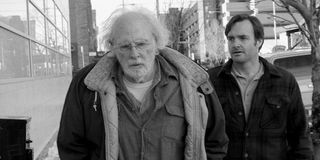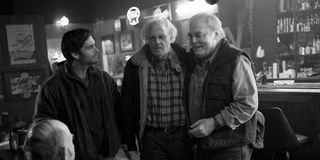The Long Road To Nebraska: Talking With Screenwriter Bob Nelson

Despite having great screenplay buzz or talented stars and filmmakers attached, some movies can just never find a way to get made in the Hollywood system. After years and years, most wind up in what’s colloquially called "development hell" where they will spend an eternity in pre-pre-production never taking the necessary steps to actually get done. There are those that escape, however, and in the case of Nebraska, the new film from director Alexander Payne and screenwriter Bob Nelson, the final product is worth the wait.
With the film now out in theaters, I recently had the chance to chat with the movie’s screenwriter and dig in deep about the script’s roots and what it took to get the movie made. Read on to find out the initial inspiration behind the story, the actor who Nelson was actually thinking about while creating the lead character played by Bruce Dern, and the new project that he has been developing with Community’s Joel McHale.
This film was in development for a really long time, right?
It’s been a long time since it was optioned and Alexander [Payne] became attached. There wasn’t really much development after that. We just, it was basically waiting for Alexander to find the right time to do it.
What was it like finally getting the chance to see the movie on the big screen?
You know, the first time I saw it on the big screen was at the Cannes Film Festival, so, I mean, when something like that happens, there is the thought in your head that maybe I should just retire now. It’s ridiculous to even think in those terms, that that’s how it would happen. I’m still rather stunned. I was stunned ten years ago when Alexander became attached and now that it’s a reality and it’s going out to theaters, it still seems very unlikely to me. Sometimes I feel like if people are calling to tell me that you’re going around and saying that Alexander Payne directed a film you wrote, then you have to stop saying that, knock it off. I would go, ok, now I get it, but no, it is surreal.
You mentioned that you’d been working on this script for a long time. Where did this project start? What was your initial inspiration for the story?
CINEMABLEND NEWSLETTER
Your Daily Blend of Entertainment News
Well the story started, I’d heard about this actually happening, older people showing up at sweepstakes offices because they were afraid to put their winnings in the mail. So, that actually happened and I was writing and performing on a show in Seattle called Almost Live for ten years and I heard about this towards the end of our run in the late ‘90s and I just had it in the back of my mind that there might be a story there. What do you do if you have a parent who might be entering dementia and insists on doing this and what do you do, but at first I couldn’t get over the hump that if they’re just in the car together driving, that could become pretty tedious, if I make this little independent film that I just couldn’t get past the repetition of the father and son just arguing it out and whatever they learned in that car on the trip. So, it took me a ridiculously long time to come up with the idea of going to the dad’s hometown, and that’s when I really became excited about it because then you can bring in other characters and have a story revealed through them, about the main characters.
The story is very character based and you have a lot of these close relationships between the characters, but at the same time, the dialogue is very curt - it’s very short and to the point. What was the challenge in constructing that kind of dialogue?
Well, I think, for me, I came from a sketch comedy background, so I was used to every word having to count. In three minutes you have to create this world and the characters and then deliver. So in a way, I think that taught me some brevity and in this case, it fit the characters, especially Woody. I brought in and I just saw his son as being confused about who this man is. He grew up with and now is seeing grow older and he still has no idea who he has, so he also, he doesn’t really know what to say to his dad, so in a way they’re not talking much and that’s part of the reason I included the Kate character was to, kind of falling back on my comedy background, I thought I needed to have someone bring some humor in and when I first wrote it, she was just in the first act, but then I thought, I need her in Hawthorne, so whatever I had to do to get her to Hawthorne, and the nice thing about that was that it helped me create that part of the story and it also besides her being the comic relief in Hawthorne, she also becomes a major player in the plot points. So, just going through that whole development process on my own, it all was helpful and Woody is somewhat based on my own father. So, I was able to kind of remember his voice while I was writing it and he didn’t talk a lot, and part of it was, I guess, experiences he had in World War II. They said he came back a little quieter than he left, so that’s where I started.

You talk about infusing the comedy into the drama and that’s actually one thing that really struck me about this film - the blend of tones is absolutely incredible. There really is this inherent darkness and sadness in the subject, but there are lighter moments that are meant to have the audience laughing. Where do you start creating that that balance, makinsg sure the comedy doesn’t undercut the drama and the drama doesn’t remove some of the comedy?
Well, you’re right. That’s tricky, and trying to find that right blend was the hardest thing for me. At some point you have to leave it up to others to decide if you hit that mark, but I grew up on Billy Wilder films and Hal Ashby films and those guys were the masters of finding that right blend, and I think of Alexander Payne as being in that lineage of people who can find that right blend, so I got very lucky in Alexander attaching himself to the project and finally making the film, because if anybody can do it these days, like Billy and Hal did, it’s Alexander.
I’m curious about that collaboration also, because this is the first film that Alexander Payne has done where he doesn’t have a credit for the screenplay. How did the two of you work together? Where did your collaboration start?
Well, after he became attached, he gave me notes and I did a rewrite and after that it was basically in his hands. So, even though he doesn’t have a writing credit, he did do a lot of work on the screenplay as well. As an example, in my draft, David’s character works in a cubicle. You don’t even know what he does, and his brother’s an insurance salesman, so Alexander gave them different professions, so they would have a little bit of sibling rivalry going on. So he helped create more of a story between the brothers. The only real conflict I had between them was how to deal with their father. He put another layer on that, that there’s also a little bit of, so when you have that scene where they collaborate with the air compressor, I think it gives that a little bit more meaning. So, that’s the kind of thing that Alexander did with the script and watching it back now, his lines, a lot of the lines came from him. A lot more than I remembered the first time I saw it. Now I’m going, "That’s Alexander there."
But honestly that’s a great sign, the fact that your authorship kind of melded together and created this film.
Yeah, I mean, when he sent me back his rewrite and said, "Let me know what you think," I thought it was great. Mine was, I would say my draft was probably just a little softer. I think he toughened it up. He made it a little more earthy and I think that was the right thing to do. In doing that, he did what I was hoping he’d do. He turned it into an Alexander Payne film. I knew to do that, he would have to believe in every line, so if he felt that he needed to substitute one of his own lines, that’s what he did and I thought that was the absolute right thing to do.

You mentioned the small changes that were made in terms of characters and stuff, but were there broad strokes that changed as well or was it kind of, was the first draft and what we see in the final cut very similar to each other?
It’s pretty close. I mean the story structure, most of the scenes are similar. He added the Mount Rushmore scene, things like that. It’s really hard, because he didn’t go in and just bludgeon my script. He went in like a surgeon and did some very detailed work. So, his hand is evident throughout it, but he was very respectful of what I had done, and only made the changes that he thought was necessary. It would have been very easy for him to really go in and tear it up and start over, but he didn’t do that.
I can imagine there would be so many writers who would be so protective of their own material that they would reject any change, so it’s amazing to hear that you were so open to his suggestions.
Well, yeah. Somebody said to me, you don’t seem to have a lot of ego about it. I mean, the truth is, once Alexander was attached, I’d seen the movies he’d done, I thought he should take it and run with it and he was respectful. He would ask for my opinion and send me an email every once and a while and send me the draft and I was actually afraid of giving him notes that he might do out of courtesy that weren’t right. I was almost afraid to give him my thoughts because of that, but that’s because of who he is. I could easily imagine if it had been a different director, who I felt was taking away from the story that I wanted to write, I certainly would have let myself be known. So, it’s just, you know, I say if you work with Billy Wilder or Hal Ashby or Alexander Payne, I think you’ve got to let them take it and make it their own.
While you were writing the script were you thinking of an actor for the role of Woody? Bruce Dern is just so phenomenal in the part and it’s a perfect fit.
It’s hard to imagine anyone else at this point, but I didn’t think in terms of, I didn’t even think it terms of this would ever get made, for one thing, but I didn’t think in terms that he would actually be in it, but I pictured Robert Duvall because for one thing, he’s one of my favorite actors, but he also looks like my dad. So, I used Robert Duvall when I was writing it, in my mind. I didn’t imagine any of the other characters from real actors, but that did help though, just to have that in mind.
Just to talk a bit about the character of Woody, like the tone of the film, there is an interesting mix to him. He can be kind of a stubborn jerk at times and kind of unlikeable, but at the same time, underneath, there’s really an earnestness to him that makes him very accessible and sympathetic. Just in terms of how you’re gauging the audience’s reaction to the character, how did you go about progressing that character?
Well, I did start with my dad, who was not as cantankerous as Woody, but he had a lot of the same problems of, he was a machinist and he was a trusting guy and he had his tools stolen, so I was able to start with that and build off of it. I made Woody a little more cranky for dramatic purposes, but I, almost all of the characters in it are based on somebody I know, even just a little bit, because that gave me something to build on and I wanted to make sure that each one of those characters wasn’t just there to add a block to the story. Each one of those characters had their own little world that, and hopefully developed as much of it as they could within the context of the bigger story between David and Woody, but I also wanted to explore what it would be like to be the child of a parent going through this and David and Ross to me represented the two conflicting things you could feel inside just one person, at one point, wanting to dismiss him, but the other is still having this yearning to connect with him.

Have any of the people that you kind of based characters around seen the film yet?
No, and I’m not sure they’ll recognize themselves at this point. They haven’t seen it. My older brother, Don, is a journalist and he thinks that Ross is based on him and I’m not sure that’s quite correct, but I guess once he sees the film we’ll talk about it.
What are you working on now?
Well, I was doing studio assignments and I stopped a couple years ago, because I finally came up with more original options I really wanted to develop, so I’ve got about four going, but the first one I put out is called The Tribe and it’s the Mr. Mudd production company. Are you familiar with them?
I am.
They’re great people. John Malkovich’s company. I basically wrote it for a friend of mine. He started on the same show in Seattle as I did, called Almost Live... Joel McHale from Community.
That’s my favorite show on television. That’s fantastic.
Yeah, good show and he’s a good guy and we were talking and he said write something for me, and once I developed it, I decided to go with this one first. I kind of approached it as Joel and I going out as a team, with me directing and him starring in it, so when I checked in with him while I was writing it and he read the draft and when we were ready we went out and attached Lianne Halfon and Russ Smith and now we’re out trying to raise money.
Can you tell me a little bit about the project, about the story?
Yeah, it’s called The Tribe and it’s based on a lot of these reservations, Native American reservations in the northwest, opened casinos, around the country, and some of them did very well with the money and in some cases, built their own schools, and before that the kids would go to public schools near them, but when they built these schools, they had to start from scratch and this story is based on reality in that way in that they had to go out and recruit teachers and coaches, and in this case Joel is a coach that is recruited to come in and coach this first years of girls softball team at the high school.
Is it kind of similar tonally to Nebraska in that it blends drama and comedy?
Yeah, it’s pretty close, yeah. I hate the word, but it’s another dramedy. Yeah, and I wanted to make sure that it wasn’t, that the white guy coming in to save the day or the white guy coming in to learn his lesson. I started out with the goal and it’s something I worked out with Joel at the very beginning, that at least three of the girls and three of the Native American adults have to have real full stories in this as well as you and you’re all going to be interacting. This movie isn’t just about Joel’s character. It’s about these people who are leading real lives themselves that are due some respect. So, we tried to be really careful about that and I guess we’ll see if we succeeded here.

Eric Eisenberg is the Assistant Managing Editor at CinemaBlend. After graduating Boston University and earning a bachelor’s degree in journalism, he took a part-time job as a staff writer for CinemaBlend, and after six months was offered the opportunity to move to Los Angeles and take on a newly created West Coast Editor position. Over a decade later, he's continuing to advance his interests and expertise. In addition to conducting filmmaker interviews and contributing to the news and feature content of the site, Eric also oversees the Movie Reviews section, writes the the weekend box office report (published Sundays), and is the site's resident Stephen King expert. He has two King-related columns.
Most Popular




